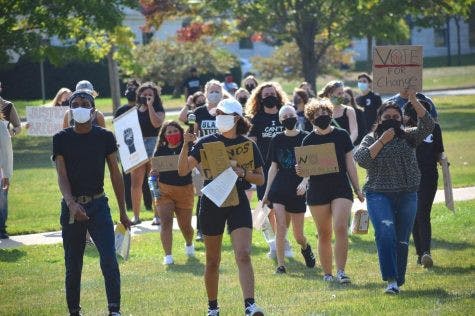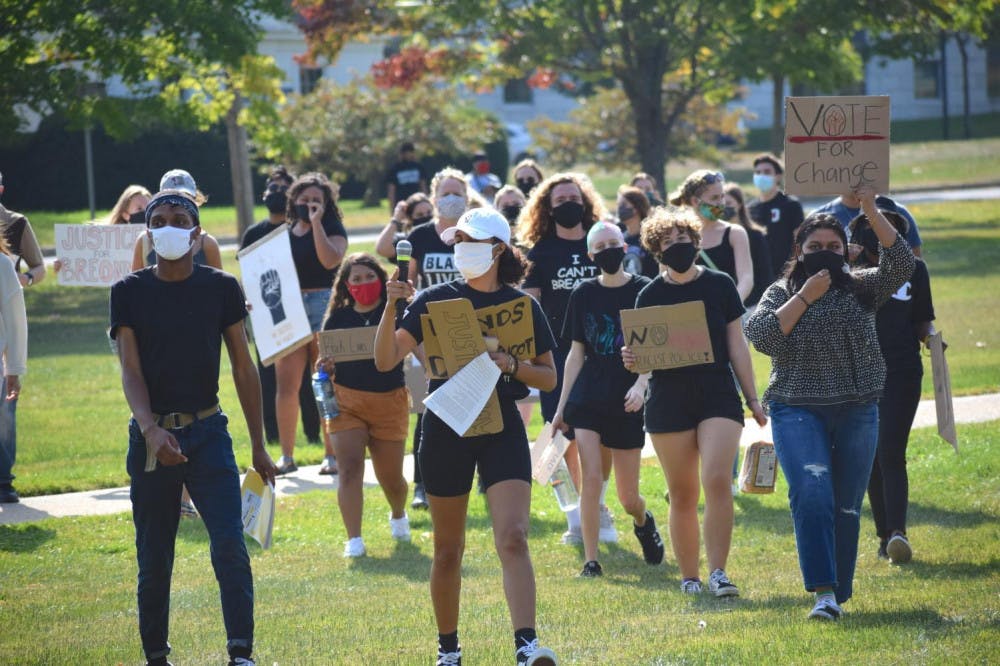Three months ago, we editorialized on the importance of working and thinking beyond the Instagram stories and Twitter trends revolving around performative anti-racist advocacy in the wake of the murders of Ahmaud Arbery, Breonna Taylor, George Floyd and many more. “As protests and racial justice begin to leave the national discourse — our actions from this point onward are key in implementing concrete changes and forwarding genuine change,” the Editorial Board wrote in July.
Implementing these concrete changes at Middlebury — that dismantle structures of institutional racism and engender cultural shifts that decenter whiteness and white comfort — are more imperative and urgent than ever before. On Friday, Sept. 25, just hours after more than 500 hundred students marched on College Park protesting the Breonna Taylor verdict, Rodney Adams ’21 and Jameel Uddin ’22 were accosted by two white students who referred to them using a racial slur. Then, on Thursday, the Political Science department in conjuction with the widely contentious Alexander Hamilton Forum sponsored a debate titled “1619 or 1776: Was America Founded on Slavery?”

It has been made painstakingly clear that Middlebury must come to reckon with our complicity in the occurrence of overt hate speech — but also grapple with how institutional recognition of certain events leads BIPOC students to question their place on this campus. We must also recognize for whom the consequences of such events have just been made clear, and who has always known such stark injustices to be apparent and normalized.
While many white students expressed shock and dismay in response to these incidents, entrenched racism on campus has always been a demoralizing reality for BIPOC students. For them, the use of explicit racial slurs, an academic climate that treats the lived experiences of BIPOC students as topical academic theories and the morally deficient outcomes of police brutality verdicts aren’t just unsurprising — they’re expected.
Students, in their own right, have a vital obligation to reach far beyond their aesthetic Instagram infographics to bridge this disconnect. And while holding our peers accountable day in and day out is critical, we cannot let the administration off the hook for the role they play in abetting racism on campus.
This summer, our inboxes were peppered with promises we have yet to see reach fruition, from the half-a-million dollars to support nebulous “anti-racist programming” to obscure plans for a new task force, a DEI (diversity, equity and inclusion) action plan and supposed initiatives at the board and trustee level. Students remain in the dark about these initiatives, and we urge the administration to double down on a much-needed sense of urgency that has appeared absent thus far.
[pullquote speaker="" photo="" align="center" background="on" border="all" shadow="on"]We cannot wait for an amorphous five-year plan to tackle racism on campus. We must see material steps being taken as soon as possible — not just ambiguous lip service directed towards students who require both answers and healing. [/pullquote]
These steps in question are not a mystery. The letter to President Patton published last week in The Campus by Adams and Kaila Thomas ’21, the organizer of the Breonna Taylor protest, outlined a myriad of definitive demands ranging from Black faculty and staff recruitment efforts and a comprehensive Black Studies program to a compensated body of Black students responsible for creating distinct anti-racist initiatives alongside the Senior Leadership Group.
It is becoming increasingly evident that Middlebury does not have a concrete framework for addressing the racism that is embedded in the fabric of our institution. The administration has not only lacked adequate clarity and urgency — they are also unprepared.
This dilemma draws a parallel with another serious aspect of Middlebury life that we have been considerably prepared for. When it comes to Covid-19, we have extensive infrastructure in place to tackle the general campus culture surrounding everyday actions. Conversations regarding Covid-19 safety and responsibility aren’t just encouraged, they’re unavoidable. From classrooms to residence halls to required trainings, Middlebury has ensured that this discourse has become a natural part of our daily lives.
But why is it can we not have the same all-encompassing focus on campus toward anti-racist work? Why have dialogues surrounding race and race-based advocacy been confined to a specific few while many — predominantly white — members of our community get to skate by? Why is it that some professors can choose to go the entire semester without once having to confront inequities in their own classrooms?
It is long past time that we as a community stop placing these conversations and actions on the back burner. We students have a lot of work to do, but we expect that the powers that be will meet us halfway. We can no longer afford to be surprised by manifestations of both structural and interpersonal racism at Middlebury, and we can no longer be complicit in enabling the circumstances that allow such manifestations to be perpetuated.
This editorial represents the opinions of the Middlebury Campus’s editorial board.
Racial justice is impossible without institutional support

Comments


